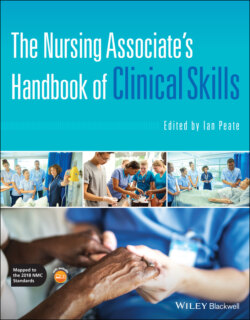Читать книгу The Nursing Associate's Handbook of Clinical Skills - Группа авторов - Страница 219
From a Legal Perspective
ОглавлениеThis chapter cannot attempt to compete with the many texts that have been written on the legal duties of a nurse. See Table 8.1 for an overview of some elements of legislation that impact on record‐keeping.
Table 8.1 Some aspects of legislation that impacts record‐keeping.
| ASPECT OF LEGISLATION | DISCUSSION |
|---|---|
| Access to Health Records Act (1990) | This relates to records of deceased patients since 1 November 1991; however, access is only allowed if the record would not cause harm to any living person. |
| Access to Medical Reports Act (1988) | Allows individuals to apply in writing to access their health records and then allows patients to disagree with a report or to correct any inaccuracies; however, access can be denied by a doctor if they feel that the record could harm the individual or that the record also has information relating to a third party who has consented to the release of the record. |
| Civil Evidence Act (1995) | This Act allows the use of records as evidence in civil legal proceedings |
| Computer Misuse Act (1990) | This Act created three separate offences. The first is the unlawful access of computer records, the second is access with the intent to commit further offences and the third is the unauthorised modification of computer materials. |
| Data Protection Act (1998) (updated in 2018) | The Data Protection Act regulates how personal data is processed regardless of how it is stored, i.e. manually or digitally. Processing data includes how a record is stored, obtained, recorded in the first instance, used (including disposal), disclosed and shared. Eight principles underpin this Act. The Data Protection Act was updated in 2018 to include General Data Protection Regulation (GDPR) standards from the European Union. The Act was updated to ensure that the law was fit for the digital age and the ever‐increasing amount of personal data that is being generated and being processed. More about the Data Protection Act can be accessed through an internet search or nursing textbook. |
| Freedom of Information Act (2000) | This Act makes it a requirement for public bodies such as the NHS to make records available if asked for them. There are restrictions such as public interest whereby it may be judged that it is not in the public interest to have some records made public. |
| Public Interest Disclosure Act (1998) | This Act makes it clear that any record can be made public if the disclosure is in the public interest. This is often referred to as whistleblowing and can be described as the time that confidentiality can be broken in the instance of a ‘qualifying disclosure’ |
